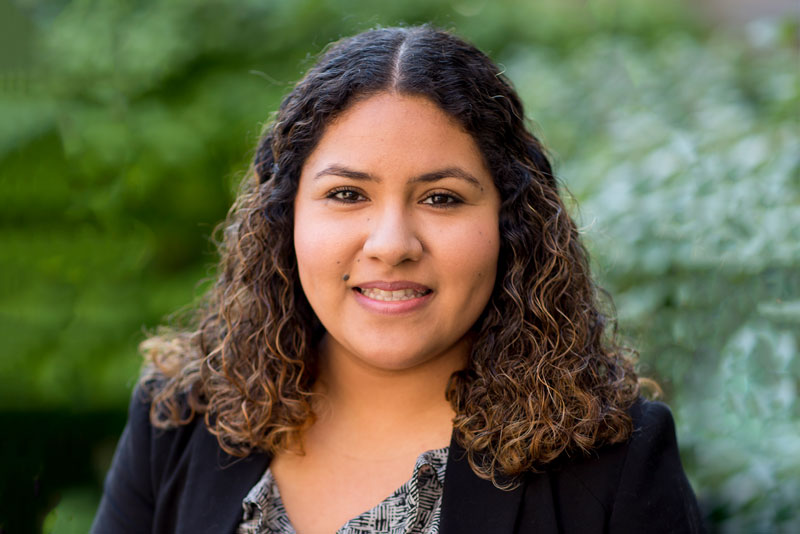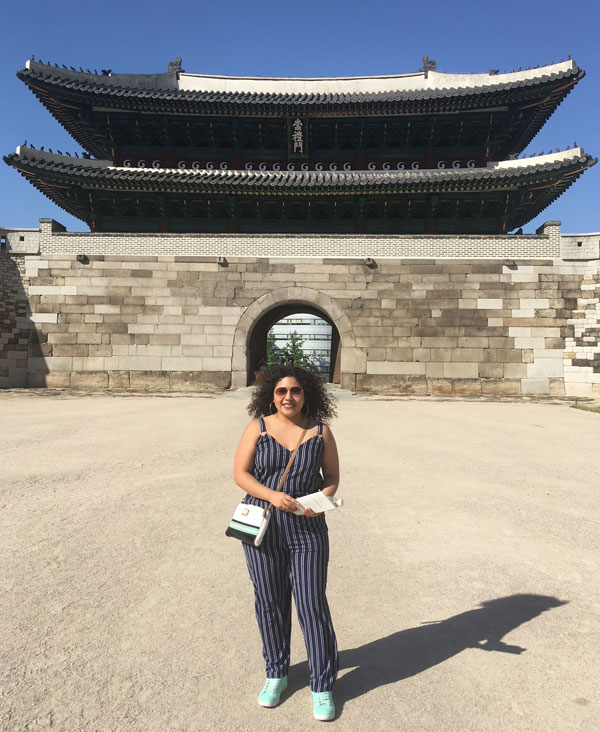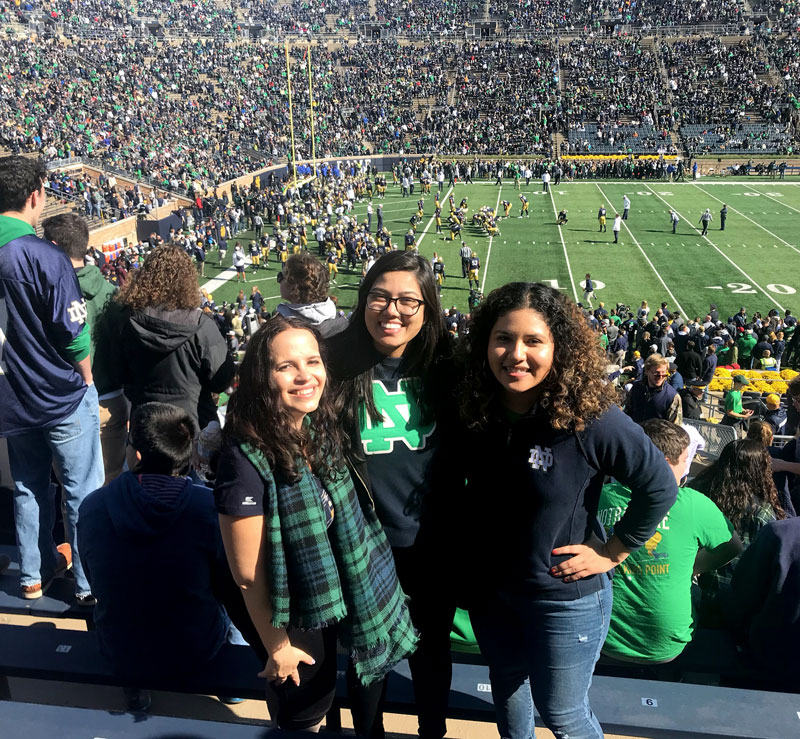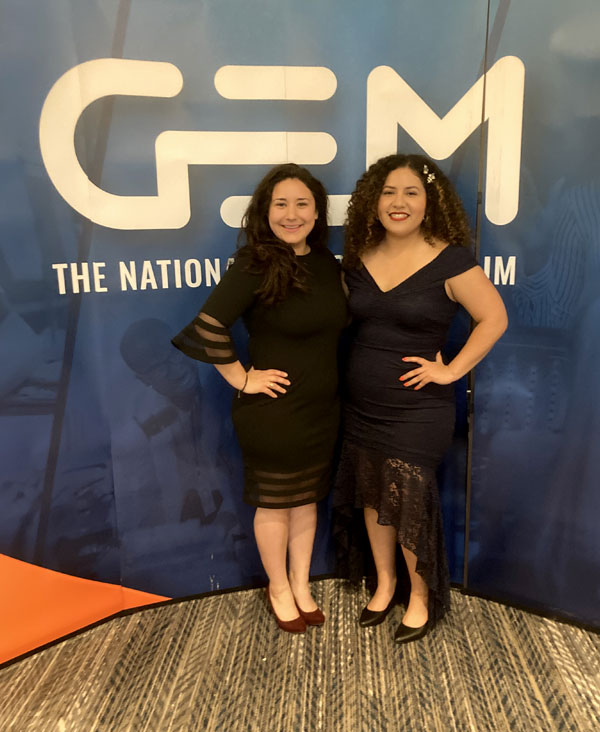
Not a single member of Karen Angeles’ extended family in southern California had ever attended college.
It just didn’t seem like a realistic possibility because it had never been done before. But Angeles didn’t stop at college—she continued onward to Notre Dame to get a doctoral degree in structural engineering and will graduate on May 20.
In her wake, a cousin two years younger followed her example. And her younger brothers have never questioned whether they can go to college.
“It’s creating opportunities for our entire family. So I think that’s where a lot of pride comes in, from knowing that we’re lifting each other up by doing things like pursuing higher education.”
“It had a domino effect,” Angeles said. “I was just figuring it out as I went along, hoping and praying that someone was going to let me in. And it’s crazy what happens within 10 years—how much changes—just because one person had the audacity to go do something new.
“It’s creating opportunities for our entire family. So I think that’s where a lot of pride comes in, from knowing that we’re lifting each other up by doing things like pursuing higher education.”
Angeles is one of many first-generation students who will graduate this year, earning her degree from the Department of Civil and Environmental Engineering and Earth Sciences in the College of Engineering. She credits the support of her family; her mentor, Tracy Kijewski-Correa; and a series of “pipeline programs” for helping her navigate an unfamiliar trail.
Angeles was born in her namesake city and grew up with three younger brothers. Both of her parents are Mexican immigrants; her mother works in flower cultivation and her father in construction, which first sparked her interest in the industry she would eventually study.
Her under-resourced high school sent few students to universities and didn’t have AP classes or college counselors. Even though she was the valedictorian, it was still “a huge deal” for her high school and family that she got into the University of California San Diego, where she won grants and scholarships to cover all costs.

“There was really no infrastructure to help students get into college,” she said. “I did an Upward Bound math and science program, and that taught me what I needed to know in terms of applying to schools and scholarships, as well as filling out the FAFSA (Free Application for Federal Student Aid).”
Angeles said she struggled at first with the culture shock of academia, as many first-gen students do, but found her footing when she began taking upper-level courses in structural engineering. A pivotal moment came in 2015 from the Summer Research Opportunities Program at Notre Dame, a 10-week program where prospective graduate students work under the guidance of a faculty member.
Her adviser then and later was Kijewski-Correa. Angeles worked on an experimental program looking at different solutions to create earthquake-resistant housing for Haiti in the wake of a 2010 disaster.
“It made me realize I can use the stuff that I’m learning in the classroom to now start working on actual-world problems that are going to affect actual stakeholders,” Angeles said. “Tracy was instrumental for me even before I started graduate school because she allowed me to really take ownership of that summer program and she supported me through the application process for grad school and she wrote me letters of recommendation.”
The decision to switch from the design side of structural engineering to the risk assessment side and to come to Notre Dame for graduate school in 2016 was a natural outcome. Angeles also found support from national programs fostering diversity in STEM fields. She won a Dean’s Fellowship from the College of Engineering and a highly competitive National Science Foundation Graduate Research Fellowship, which provides five years of funding and elevated status in the research community.
And with the urging of Nyrée McDonald, associate dean of graduate enrollment management, she applied for and gained access to the National GEM Consortium, a nonprofit founded at ND in 1976 that provides fellowships for top students from underrepresented communities who are pursuing graduate degrees in applied science and engineering.

“I’m a Latina woman in civil engineering; there’s very few of us around,” Angeles said. “Being able to be part of GEM was really great in terms of professional development, but also in helping me create community both within and outside the campus.”
Angeles’ doctoral research focused on the development of data-driven workflows that advance the capacity for at-risk communities to prepare for and recover from large-scale disasters.
“Disasters like earthquakes and hurricanes affect the built environment, but also society at large,” she said. “The damage that affects buildings and other kinds of civil infrastructure, all of that eventually gets quantified into a set of performance metrics through what we call loss-assessment frameworks.
“The bulk of my work is looking at how we can use open data to really enhance the robustness and granularity of those loss assessments. The ultimate goal as a modeler is to be able to tell you as a homeowner, for example, that you need to replace your roof because the next time a hurricane comes, it’s going to get blown off.”
In her dissertation, she incorporated open data from a variety of sources, including property appraisals, building permits, local building codes and national surveys. She focused on Florida’s Bay County, where Hurricane Michael devastated the region in 2018.

Angeles defended her dissertation in late March, but she had to do it remotely because she took a job in Boston last October. She said she began graduate school intending to become a university professor, but she couldn’t turn down the opportunity from Verisk Extreme Event Solutions, which focuses on providing modeling and data analytics services for the insurance market.
“I was trained as an earthquake engineer, then I became a wind engineer, and now I’m on the flood vulnerability team at Verisk,” she said. “I inadvertently became a very interdisciplinary researcher, a structural engineer with data analytics skills.”
That range made Angeles valuable to her employer: “I have the capacity to understand different programming languages, and I can translate what happens to a building from an earthquake versus a hurricane and now a flood.” And being in the private sector gives her access to a much larger scale of data. She is currently working on the development of a new flood model for the United Kingdom and Ireland.
She said her family is ecstatic to celebrate her Commencement, traveling from California to see her walk across the stage at Notre Dame.
“They understand how much work I’ve put into it and how much effort and support I’ve needed to get through it,” she said. “My parents have seen me go through the blood, sweat and tears of getting a Ph.D.”
In her family, what was once unthinkable is now the norm.